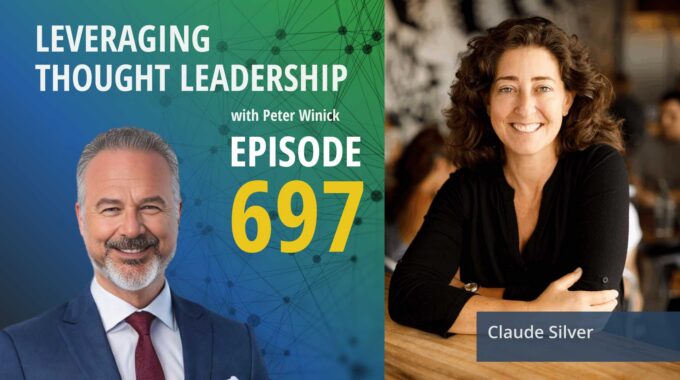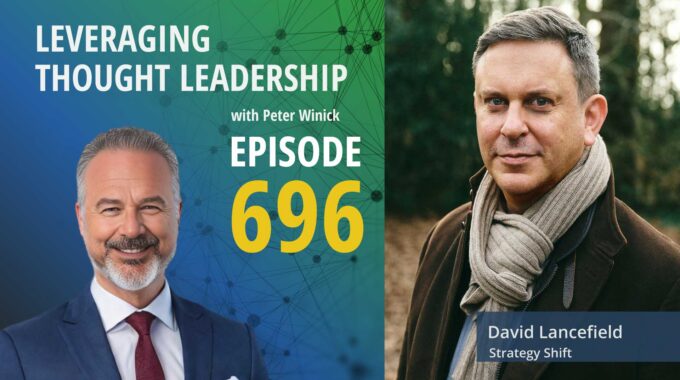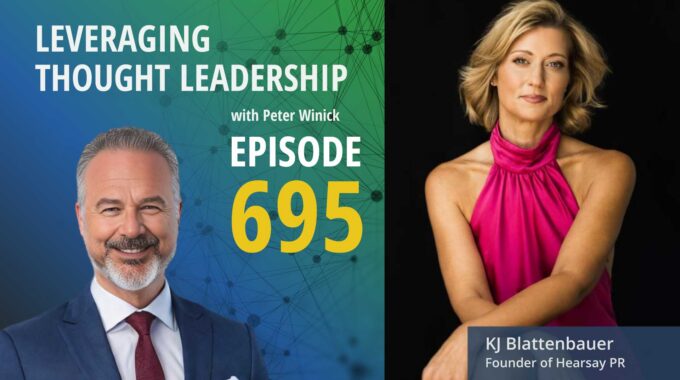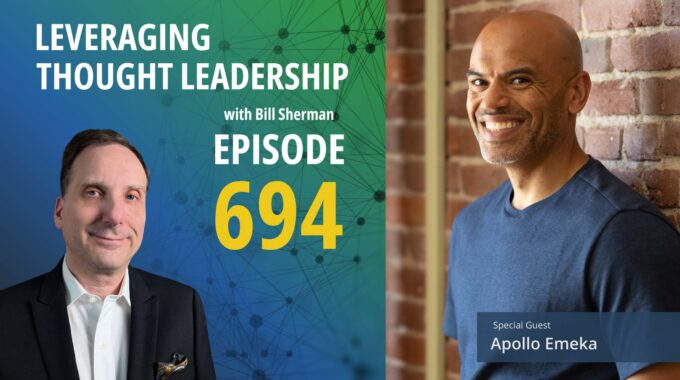Frameworks for connection, accountability, and performance This episode examines how psychological safety drives performance, how…
Thought Leader Growth | Todd Cherches

Overcoming being an introvert to become an effective speaker and author.
An interview with Todd Cherches about starting out working for various TV studios and growing into a speaker, author, and consultant.
Today’s guest is Todd Cherches, the founder of Big Blue Gumball, a consulting firm specializing in leadership development, management training, team building, public speaking and coaching. Todd is a TEDx speaker and the author of VisuaLeadership!
Todd shares his story of the winding road that took him from his dream of working at TV studios to becoming a thought leader. We explore the challenges introverts face and how to grow as a speaker and trainer. Todd explains how his book was born from ten years of notes and 2000 pages of content. He shares valuable advice for getting your idea on the page and hitting a deadline.
Three Key Takeaways from the Interview:
- When opportunities present themselves, thought leaders need to jump on them even if they feel out of their comfort zone.
- Introverted thought leaders can be excellent speakers with time and practice.
- Getting a book written on your thought leadership will require dedicated time to write without distraction.
If need help with your thought leadership growth, contact Thought Leadership Leverage. Also, we can help devise a strategy to reach your target audience and assist with many other aspects such as marketing, branding, research, and sales.
Transcript
Peter Winick Welcome, welcome, welcome. This is Peter Winick. I’m the founder and CEO of Thought Leadership Leverage. And you’re joining us on the podcast today, which is Leveraging Thought Leadership. Today my guest is Todd charges Todd is a guy that checks multiple boxes on our list here. He’s the founder of the consulting firm Big Blue Gamble, which is a New York based consulting firm specializing in leadership development management training, Teambuilding, public speaking and coaching is a tenant speaker on visual thinking. He’s an adjunct professor at NYU, and he is, as of late, like moments ago, almost a published author of a brand new book called Visual Leadership Leveraging the Power of Visual Thinking in Leadership and In Life. And here we are. Todd, welcome aboard.
Todd Cherches Thank you, Peter. How are you doing? It’s great to be here.
Peter Winick I’m good. So answer this for me. So consultant Ted, Speaker author, academic. Lots and lots of different things. How the hell did that happen? How did you get here?
Todd Cherches I have no idea. That’s a really great question. That’s. Yeah, and I teach leadership in the H.R. Master’s program at NYU and it’s all people are always talking about a career path as if it’s a linear thing, right? They’re on this path and you just control that and you know, not a path. It’s a roller coaster with ups and downs, twists and turns. So I actually started out my dream was to work in television from a young age. I was allowed to be a baseball player and I didn’t have the skills for that. So yeah, I also work in television, so I was actually a bookworm as a kid. I read the complete works of Shakespeare by the time I was 18, so that was one my claims to fame, so something about my social life. But I was going to.
Peter Winick Say So I want to ask you about your dating life in high school, because.
Todd Cherches You did for college. So yeah. Okay. Well, I love watching television, so both of those things, but both TV and really what they have in common was story, story. Every story has a beginning, middle and end. This character, this arc, there’s challenges. There’s the hero’s journey, right? There’s a villain and a hero in every story. And years later, I found myself doing leadership development and in the workforce, it was like very a lot of parallels. It’s like we’re all living our own life story. I actually started out after college working for Ogilvy and made their advertising because I wanted to work in television, and most of those jobs were in L.A. But growing up in Queens, as I believe you did, right? Yeah, yeah. You’re living in New York and all work in television. Advertising was a good start. So. Right. And this is just after the Mad Men days, so it wasn’t like the Don Draper thing happening, but it was very close at the time. I tell my students there were only three TV networks at the time and I was born in 1985, so Fox had just started. So a very different world than the world we’re living in in terms of choice. Those are the numbers guy. And my job was to calculate ratings and shares and ad dollars. So after a year of that, I couldn’t take any more. So I went to visit a friend in L.A. who had moved out there, a college roommate, and I fell in love with L.A. I saw the Hollywood sign. And so even though I’m a huge introvert and it was a huge risk for me to leave home, I was still living with my parents at the time and commuting into the city and moved out there and said, Hey, let’s see what Hollywood has.
Peter Winick Interesting. So I love doing the non-linear piece because what I find is that for some folks, more traditional, you know, teaching, accounting, medicine, obviously certain corporate jobs, there is a very linear piece to it, right? In order to teach, you have to student teach, etc.. But in the sort of thought leadership space, roller coaster, ping pong ball, you know, call it what you will, it’s being open to the experiences that where life takes you and then figuring out, you know, what to make of that. So here you go from a guy that wanted to be in television and you’re a consultant that also teaches at NYU and has written a book. So there’s a roller coaster. There’s three loops on the roller coaster. I missed it. How did you get from L.A. to New York besides gap gaps?
Todd Cherches So basically, long story short, I got out there, I knew the job survival job. So I took a job as a bouncer in a nightclub. So that’s a whole other than one night I got punched in the face and my glasses broken by this drunk guy. And I my bouncing career quickly ended.
Peter Winick But was there a Shakespeare test to be a bouncer? Because I don’t I wouldn’t call the bouncer type.
Todd Cherches I actually that was a good way to meet women, though I have to say.
Peter Winick Quoting Shakespeare, you.
Todd Cherches Know, more being a bouncer at a club. So you give someone a clipboard and then you put them in a suit in front of a door behind the velvet rope, and you have all of a sudden the posture, confidence and your and your power. So that was my first ever position of power. So I actually got a job working for Michael Nesmith of The Monkees, most likely. No idea who he is, but with baby boomers like us and the name recognition that I worked, I started out in the mailroom and then they were like, What are you doing in the mailroom with a master’s degree in communication, a bachelor’s in English? And I’m like, Well, I just needed a job. So they got me a job in marketing. I did that for a while that I worked for Aaron Spelling, just putting scripts together for Dynasty. And then I got my first real paid job working for Columbia Pictures television in casting administration, working on contracts and things like that. Then I got a job at Disney working as a writer producer, and then at CBS, I was assistant the vice, the director of drama program development at CBS. So right there, that was my TV. So my view of TV work in TV actually started to come true. Fortunately, it was not the dream I envisioned. There was actually more of a nightmare. You’ll have to read my book to hear some of the stories, including the one about my boss at CBS. He threw a box of pens at my head because they were medium point and she wanted the fine point so that the whole story could go into her life. But as my years of TV and I eventually got a job in the theme park business as a project manager, So after ten years of amazing experiences but just never felt at home in LA. Move back to New York. And that’s when I started in the magical News consulting business.
Peter Winick Very cool. So given that your book literally just came out, what is it this week or couple of days ago?
Todd Cherches It actually launches next Tuesday or next Tuesday. Okay. I got the advance copy just yesterday, so I’m literally holding it in my hands right now. I sleep with it. My wife is like, I call you from room to room.
Peter Winick So it’s like a puppy.
Todd Cherches Like a new baby or a new puppy. Exactly. Right.
Peter Winick So, okay, so you’re in that just on the cusp of launch. So you spent lots and lots of time, energy, blood, sweat and tears pouring it in. So tell us sort of the backstory of why you decided to write a book, how it came to be, you know, how much easier it was and faster it took than you ever anticipated.
Todd Cherches All right. So, yeah, it was actually I say it’s a journey as one of those cliches, but this literally was a journey I started. Well, it’s interesting. I started doing national leadership development years ago. First of all, as an extreme introvert. So I was always a behind the scenes kind of guy. I always designed and developed program with trainers. And then here’s my story about how I got in the room For the first time. We’re doing a leadership program for 12 CEOs of small companies in Hilton Head, and the instructor didn’t show up. He had gotten sick. He missed his flight. And there was that morning, the first day of the morning of a three day program, I called back to the office in New York and I said, What do I do? We have no trader. And they’re like, Well, we have two choices. We cancel and get completely embarrassed and humiliated. And sure, you’re going to have to do it. And like, excuse me, I think there’s something wrong with this connection. I thought so. We had no other choice. They said, you know, you know the content inside and out. What’s the problem? What’s the problem? I literally have never spoken in front of more than one person at the time in my entire life. So long story short, I told the people what happened. We did it. And, you know, it wasn’t so bad. I wasn’t so bad and I didn’t hate it. And little by little over the years, I took it up on a course to work on my public speaking skills. And I became a coach. I became a trainer, and I launched my whole public speaking career. I wouldn’t be doing it if not if I hadn’t been thrown in accidentally, I probably never would have volunteered to do what I do. And now I teach at NYU and Columbia, and I just did a webinar for 450 people globally the other day that have done that.
Peter Winick I want to touch on something you said that I think is interesting. The several things you said were interesting, but one in particular. Well, you know, the reason that person said, well, go for a tide was a you’re the only guy left to do it. But Buddy, you knew the content inside and out. So that I would assume, even though, you know, you weren’t wired to be sort of the performer type, there was a level of confidence versus if it was maybe get up and can you deliver the speech and here’s the paper and you’ve never seen it before. I was like, You might have had a different reaction.
Todd Cherches I’ve had to do that since then. I’ve had situations where I was once I was doing a workshop with a client and the company I was working for sent the wrong manuals. So I had the author like open up the page one and they had the manuals for a completely different course. So I said, I was like, Do I teach the course that they have the manuals for supposed to do? And we figured out, luckily I had a flash drive. That’s a tip. Always have a backup. Yeah. And so I was able to print out copies that we were able to use later on though. But that’s a good point is yes, I knew the content, but presenting is a completely different skill set. We’ve all seen great authors who are horrible public speakers. We know it’s.
Peter Winick Tough to talk about that for a minute because there are plenty of authors out there. I can recall the first time I saw Malcolm Gladwell speak after Tipping Point came out, and like everybody else, I was enamored with the book. I love the book. It’s amazing book. I’ve never anything like this, whatever. And then I got to hear him speak and I was like so disappointed. He was so dry and so awful. And then as I was walking out of the place, I said, Well, of course he would be like, He’s an introvert. He The New Yorker, he’s kind of a nerd, whatever. So why would I expect him to be outgoing and charismatic and training? Now, fast forward. I saw him speak again two, three years later and he’s one of the best out there. The physicality of his hair and I don’t know whoever his coach was, but he really came into his own. But it isn’t for everybody. I mean, you can be, you know, an intellectual or an introvert that, you know, put stuff down. On paper. That’s awesome. But I get you in front of the room and it’s like, my God, it’s paint dry. So how did you how did you cross the jasmine, if you will?
Todd Cherches You have a completely different skill set. That’s a great example of that. In my presentation Skills workshop, I showed a clip of Steve Jobs the first time he was ever on camera. Yeah. I mean, literally, he said, I think I’m going to throw up. I got him, and he was like, I need to go there and look at him. Years later, I’m one of the great speakers of all time. So public speaking is a skill like any other. And like I said to my students in my class, it’s a skill you work on and you fail, you practice, you get better. As you get better, you take more risks. As you take more risks, you build your confidence. And it’s like the cycle. The flip side of that is I’ve seen a lot of dynamic public speakers and then the book comes out and they can’t write. So again, it’s completely different skill sets and some people luckily are, you know, it’s kind of like being a baseball player, you know, the Five Tools. Yeah, yeah, yeah. How are you? Karen? So they’re all different skill sets, but they’re all developable and just some people have more natural talent, talent or natural charisma to build on. But again, we’re all working on it. Probably about one.
Peter Winick If you’re enjoying this episode of Leveraging Thought Leadership, please make sure to subscribe. If you’d like to help spread the word about our podcast, please leave us a review and share it with your friends. We’re available on Apple Podcasts and on all major listening apps as well as at ThoughtLeadershipLeverage.com/podcasts.
Peter Winick So let me ask you this. I’ve seen sort of a third variation on that where you have speakers that are very extroverted and they do phenomenal in a large group, 300 people, 500, 2000 doesn’t really matter. But tell them, you know what, we’re going to do an executive retreat. It’s going to be 12 people and you got them for an hour and a half. And it sucks the life out of them because that’s a totally different skill That’s teaching, right? That’s not entertaining. And when you’re speaking to 2000 people, at some level, it’s an anonymous interaction, right? If I’m if I’m teaching a class of 12 people, I have to look you in the eye tonic. Look the person next to you with the idea and if you’re dozing off and checking out, holy crap, I’m losing. I’m losing. You touch on that a little bit because a lot of the sort of extroverted, highly charismatic speaker types couldn’t care less about a small room interactive workshop experience.
Todd Cherches Yeah, there is a saying either sage on the stage or are you the guide on the side? I didn’t claim that I came from right, but yeah, it’s like some people just love being on the stage, being the performer and motivate and inspire people. But being the guide on the side, you’re a coach or a facilitator. It’s what it’s all about. The other person, not about you anymore. And some people are. Yeah. So if people say, What do you do? I say I do consulting, training and coaching. Those are my three things. But any given moment, I have to know which one I’m doing based on what the relationship is, what the client needs, right? So sometimes it’s consulting like, here’s my advice, here’s why I would like some tools that will help you solve the problem and coaching conversation where it’s like, you know, let’s talk about it and you try to pull that. So we need to one of the things that I’m trained in is going back. It’s a triangle to navigate all three of those. But again, not everyone can go one step.
Peter Winick But to be great at all of those three disciplines, you have to be other focused. It’s not about you to be a great consultant. You’re solving client’s problem, a great trainer, you’re transferring knowledge, a great coach, you’re helping someone unravel something. And if you’re if it’s all about you, I mean, think about, you know, some of the most of, you know, over the top motivational speakers would be the worst coaches in the world.
Todd Cherches Definitely. Yeah. There’s very again, there’s very few. Like Marshall Goldsmith, he is known for being one of the great executive coaches and also an excellent speaker. So again, it’s like what any in any endeavor. There are multiple things I need to do. I use the analogy of a basketball player, like you’re not either a good basketball player or you’re a bad basketball player. There is shooting, passing, dribbling, rebounding, blocking like this. Different skill set. Yeah, you need on a team, you need that mix, right? Yeah, the diversity of skill sets. So but within any one person, it’s rare that everyone on a scale of 1 to 10 is a ten and all five of those areas.
Peter Winick Yeah, that wouldn’t happen.
Todd Cherches Right Then why you? I teach my model the five core competencies of an effective trade instructor which are presenting, facilitating, application coaching and interpersonal skills. Some professors are great at lecturing. They could get up in just hours. Some are like they’ll say, Does anyone have any questions? And no one answers like I was facilitating. I ask the question, right.
Peter Winick But yeah, but they must know everything. They have an admission.
Todd Cherches I was so great that there’s no other questions. But the application piece is having people bring their lives into the classroom and then back out to the real world. So the best speakers, the best thought leaders, right? You leave, they are transformed. You leave that with a thought leader. They lead you in changing your thoughts so you could use them and think differently. Back out there in the real world.
Peter Winick Yeah, I always agree. Thought leader puts a lens on you, your contact lens. You pick an analogy that you didn’t have before and you see the world through that. Ends in a way you didn’t before. I want to go back to the book for a minute.
Todd Cherches I love the analogy, by the way, because it leads us right into visual thinking. You talk about contact lenses as a as a. Yeah.
Peter Winick Exactly. Exactly. So I want to go back for a moment to the book. So if I were to ask you, when you started this process, what do you expect it to be like? And then I’ll ask you the same question. You know, Ed Todd today, what was it like? Give me the the compare and contrast of what your expectations were, if you had any, and how it played out for your experience?
Todd Cherches Well, I think I was always known for coming up with conceptual models, frameworks like these, or triangles or pyramids or whatever. We still we live in a complex, messy world. But if you can, as I did my first TEDx talk last year on the power of visual thinking, I was asked to do a second TEDx talk that was supposed to be next week, but because of the virus, the pandemic and the mental models, right. So one of my things I’m good at is taking the complexity and messiness of life, but coming up with models or frameworks into which we could fit things so we could see it more clearly. The model doesn’t solve the problem but helps to frame the problem literally. So I became good at that and I started teaching that and people kept saying, You should write a book, you should write a book. For years, my students have said and my clients have said that I thought every time I would get an idea, I would write it down. I would have a pile. So ten years worth of saying, I’m going to write a book someday. And then I was at the conference and I was writing a book, and he introduced me to his agent and he took me on and got me a book deal with Postol Press, Simon Schuster. Then it went from, okay, one of these days I’m going to write a book to nine months from now and you have to deliver your manuscript. So that’s when panic really sets in.
Peter Winick Yeah. So talk about that when it goes from sort of the theoretical to the applied, because I don’t think a book becomes real to some people until, whether it’s self-published or traditionally published, you are accountable to others because when you’re accountable to yourself, you’ve probably thought about writing that book for a long, long time. And life happens, things happen. Whatever, whatever. Never got to the top of the list. But now you’re accountable to contract and you have to deliver something by such and such a time. How does that instill creativity?
Todd Cherches Yeah, a lot of my time out of the workshop, one of the things I used, I forgot the source was that which can be done at any time will most likely be done at no time. So that deadline. And so you’re accountable to someone else, It’s probably not going to get done. It’s like a story, a blog post called These are one of these Days because we all worked at home because of the pandemic. Right? When all the things that you say, one of these days, I’m going to get around to it, this is the perfect time to get around to it, right? Because yeah, yeah. Never got more discretionary time when we’re not traveling and we’re locked at home than we do now. So. Yeah. So my friend Bryan Adams, who’s one of the gurus of innovation and ideation, I don’t know. But he said, Yeah, when you have a deadline, that’s when you write your book. And so I got the book deal and we got to have the deadline. The clock started taking There was no more. I’ll get around to it eventually. It was literally like, now we’re not just going to do by September 1st of last year. And we got it done. And exactly one year and one day from the signing of the book deal, the book was done. Another thing is to go out and get a publisher.
Peter Winick Yeah. Yeah. Did you enjoy the process? Was it what you thought? What did you like about it? What didn’t you like about it?
Todd Cherches The good thing was I got an idea about. I’m not exaggerating. I had 2000 pages of content. So.
Peter Winick Yeah, that’s a little too much.
Todd Cherches Yeah. I always say picture like visualize an iceberg, right? We have an iceberg worth of knowledge, but you only got to put the tip of the iceberg into whatever you’re doing, whether it’s a speech, a presentation, the workshop. So the hardest part was deciding what to leave out. So it’s kind of like this is saying call you up to kill your darlings, like you put these stories on models, etc.. Leave them on the cutting room floor. You just can’t put everything into that. So actually, it was I had a great other editor that I was working with and I enjoyed the process. But again, you always have the clock ticking. Yeah. But yeah, it was great. But there was nothing like going to stop me in the mail yesterday. Yeah. Yeah.
Peter Winick But, but I think the pressure of the time line in the moment might be uncomfortable, but it actually, you know, constraints forced people to be creative and to get because, you know, 2000 pages, I mean, you kind of wrote seven books.
Todd Cherches Yeah, I have all of those. But two and three are like, you know, I really just enjoy this one for right now. It’s kind of like with kids, it’s like it’s the one, and then you’ll worry about the next one.
Peter Winick Exactly. Exactly. We start to wind down any specific words of advice, be they strategic or tactical, for somebody just on the starting process of, okay, I got the deal done, whether that’s self-published or not, I’m going to start writing the book. To make that process more enjoyable, more effective, more efficient.
Todd Cherches Yeah. I mean, I could talk for hours about that, but yeah, you really kind of need to. It’s very hard. You need to focus. It’s very hard to be traveling and writing a few words here, a page there. I literally locked my self away for the whole summer last summer. So I really had no summer last summer because I was just in my office for morning till night. I work best at night, so from home and so forth. Those are my hours where the ideas just flow. So find the time by the space that you could write without distractions. Don’t pressure yourself. A lot of times when you’re working, you know you’ve got ideas in the shower, you get ideas on the treadmill, you write them down right then and there. You always range up and then edit later. Like a lot of times you try to be so perfect with every sentence you need to get it out of your head and onto the screen, and then you just do.
Peter Winick The brain dump.
Todd Cherches Things around. But in terms of the concept of visual thinking, you want to visualize what the book looks like, what it feels like. My book has a lot of visual images. Every chapter has a visual image that’s either a little image or a metaphor or model. You’re actually picture again with the other minor picture, what it looks like when the reader is reading it and work backwards from there. But those are just a few of the tips that I have.
Peter Winick Excellent. Well, this has been fantastic. I appreciate your time and your effort, and I wish you the best on the birth of the book. So congratulations.
Todd Cherches It’s always great talking to you. You got it. Thanks.
Peter Winick To learn more about Thought Leadership Leverage, please visit our website at ThoughtLeadershipLeverage.com. To reach me directly. Feel free to email me at Peter at ThoughtLeadershipLeverage.com. And please subscribe to Leveraging Thought Leadership on iTunes or your favorite podcast app to get your weekly episode automatically
Comments (1)
Comments are closed.






Love hearing Todd’s roller coaster career path moving constantly toward his dream, a hero’s journey all the way. Todd’s book is Awesome, and Peter Winick does a masterful job drawing out the back story! It reminds us of how the ups and downs, unplanned twists and turns actually help us develop the skills that we need in the end.